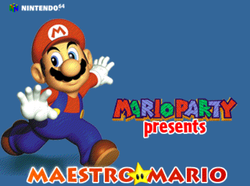Maestro Mario: Difference between revisions
No edit summary |
No edit summary Tag: Mobile edit |
||
| Line 2: | Line 2: | ||
{{game infobox | {{game infobox | ||
|image=[[File:MaestroMarioTitle.png|250px]] | |image=[[File:MaestroMarioTitle.png|250px]] | ||
|developer=Nintendo | |developer=[[Nintendo]] | ||
|publisher= | |publisher=Nintendo | ||
|release=1999 | |release=1999 | ||
|genre=Unknown | |genre=Unknown | ||
| Line 12: | Line 12: | ||
|input=Mouse | |input=Mouse | ||
}} | }} | ||
'''''Maestro Mario''''' was an {{wp|Adobe Shockwave}} game created to promote [[Mario Party]] for the [[Nintendo 64]]. It was playable from the game's official website, which was eventually repurposed to promote later games in the series as well. The game is mostly lost, as the game required a connection to the internet of some sort to work. | '''''Maestro Mario''''' was an {{wp|Adobe Shockwave}} game created to promote ''[[Mario Party]]'' for the [[Nintendo 64]]. It was playable from the game's official website, which was eventually repurposed to promote later games in the [[Mario Party (series)|''Mario Party'' series]] as well. The game is mostly lost, as the game required a connection to the internet of some sort to work. | ||
==Gameplay== | ==Gameplay== | ||
''Maestro Mario'''s content is mostly unknown, as the game breaks very soon after launching. The game boots up on a title screen for the program with a unique logo, which almost immediately cuts to a name registration screen at which [[Mario]] asks the player to tell him their name. The default text in the name registration box | ''Maestro Mario''{{'}}s content is mostly unknown, as the game breaks very soon after launching. The game boots up on a title screen for the program with a unique logo, which almost immediately cuts to a name registration screen at which [[Mario]] asks the player to tell him their name. The default text in the name registration box is "Modem." After the player registers a name, the game cuts to a screen with the text "Waiting for connection" on it. The connection always fails, cutting to an error screen that states that "There is no current connection." | ||
==Gallery== | ==Gallery== | ||
<gallery> | <gallery> | ||
File:MaestroMarioTitle.png|The title screen | |||
File:MaestroMarioTitle.png|The title screen | File:MaestroMarioNameRegister.png|The name registration screen | ||
File:MaestroMarioNameRegister.png|The name registration screen | File:MaestroMarioWaitingForConnection.png|The game attempting to connect | ||
File:MaestroMarioWaitingForConnection.png|The game attempting to connect | File:MaestroMarioConnectionError.png|The error screen after the game fails to connect | ||
File:MaestroMarioConnectionError.png|The error screen after the game fails to connect | |||
</gallery> | </gallery> | ||
{{Computer}} | {{Computer}} | ||
[[Category:Browser games]] | [[Category:Browser games]] | ||
Revision as of 21:33, November 19, 2024
| Maestro Mario | |
|---|---|

| |
| Developer | Nintendo |
| Publisher | Nintendo |
| Platform(s) | Browser |
| Release date | 1999[?] |
| Genre | Unknown |
| Rating(s) | N/A |
| Mode(s) | Single player |
| Format | Adobe Shockwave |
| Input | Mouse |
Maestro Mario was an Adobe Shockwave game created to promote Mario Party for the Nintendo 64. It was playable from the game's official website, which was eventually repurposed to promote later games in the Mario Party series as well. The game is mostly lost, as the game required a connection to the internet of some sort to work.
Gameplay
Maestro Mario's content is mostly unknown, as the game breaks very soon after launching. The game boots up on a title screen for the program with a unique logo, which almost immediately cuts to a name registration screen at which Mario asks the player to tell him their name. The default text in the name registration box is "Modem." After the player registers a name, the game cuts to a screen with the text "Waiting for connection" on it. The connection always fails, cutting to an error screen that states that "There is no current connection."



